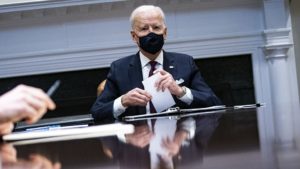
The Biden administration moved forward to formally replace the Trump administration’s public charge rule, which barred many prospective immigrants from using social services.
The Department of Homeland Security (DHS) issued a request for public comments on a new regulation to define how immigration officers can determine whether green card applicants are likely to become a public charge. The decision is the latest in a series of reforms that the Biden administration has taken to dismantle former President Trump’s immigration policies
Among those policies, under Trump DHS tightened the definition of public charge so that immigration officers could reject applicants who had used or could potentially use, services like food stamps. “The Biden Administration today took a step to ensure immigrants and their families can access health care, food assistance, and other needs,” said Shelby Gonzales, Vice President for immigration policy at the Center on Budget and Policy Priorities.
The Trump-era policy hasn’t been in place since March, when DHS stopped the implementation of the rule and the Department of Justice announced it would no longer defend the rule against an array of lawsuits challenging it. Still, the Immigration and Nationality Act requires officials to consider whether a prospective immigrant could become a public charge, without explicitly defining the term.
According to the DHS, the new process “will be fully consistent with law; that will reflect empirical evidence to the extent relevant and available; that will be clear, fair, and comprehensible for officers as well as for noncitizens and their families; that will lead to fair and consistent adjudications and thus avoid unequal treatment of the similarly situated; and that will not otherwise unduly impose barriers on noncitizens seeking admission to or adjustment of status in the United States.”
Critics of Trump’s public charge rule are pushing the Biden administration to move quickly on its formal replacement, as immigrants continue to shy away from services they could be legally entitled to. Gonzales stated, “Even though the Trump Administration’s public charge rules are no longer in effect, the damage persists. Many families with immigrants continue to forgo critical services out of fear that it will prevent a family member from becoming a lawful permanent resident. That’s why swift action to complete the rulemaking process is crucial to ensure that immigrants don’t go without health care and other services.”

Recent Comments